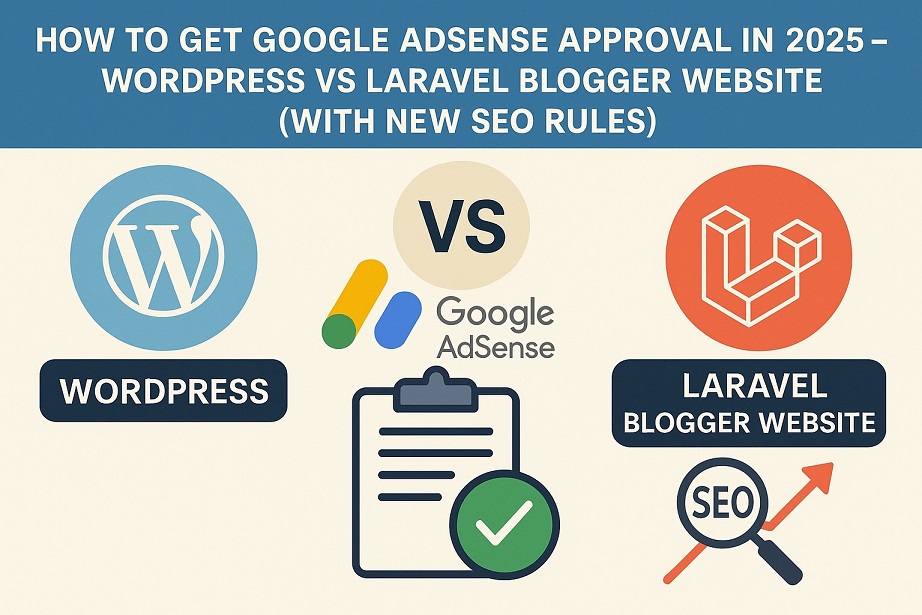How to Get Google AdSense Approval in 2025 – WordPress vs Laravel Blogger Website (With New SEO Rules)
How to Get Google AdSense Approval in 2025 – WordPress vs Laravel Blogger Website (With New SEO Rules)
Introduction
In today’s digital world, every blogger and content creator dreams of earning money through their website. Google AdSense remains one of the most trusted and widely used monetization tools. However, with Google’s new SEO and AdSense policies in 2024–2025, getting approval has become more competitive and policy-driven.
Whether you’re running a site on WordPress or a custom Laravel-based platform, this guide will help you align your blog with the latest requirements.
What's New in Google AdSense Policy (2025 Edition)
Google AdSense’s 2025 update focuses heavily on user experience, originality, and publisher transparency. Here are the most important policy changes:
1. Strict AI-Generated Content Monitoring
-
Automatically generated content (especially low-value or unedited AI content) may lead to rejection.
-
Use AI as a tool, but edit, humanize, and add value.
2. Improved Publisher Identity Verification
-
Publishers must complete identity and address verification before or shortly after approval.
-
Expect document uploads (like national ID, tax info, etc.).
3. Mandatory Content Ownership
-
You must own the content, domain, and web hosting.
-
Sites using free subdomains (e.g., Blogspot, WordPress.com) face increased scrutiny.
⚠️ 4. Low-Value Page Policy
-
Thin affiliate pages, doorway pages, or tag-only pages can lead to disapproval.
-
Pages must provide unique, original content with value.
5. Mobile-First Indexing Enforcement
-
Google is prioritizing mobile UX even more aggressively.
-
Non-mobile-friendly layouts may cause AdSense application rejections.
6. Transparency & Legal Pages
-
Privacy Policy, About, Terms of Use, and Contact pages are now required — not optional.
-
This also helps comply with Google’s publisher accountability standards.
7. Ad Experience Score
-
Google evaluates your ad layout, number of ads per page, popups, and user distraction.
-
Avoid auto-play videos, excessive sticky banners, or intrusive ads.
✅ Core Requirements for Google AdSense Approval (2025)
1. High-Quality Original Content
-
Minimum 20–30 well-written blog posts.
-
Each post should ideally be 800–1500+ words.
-
Use proper formatting with headings, paragraphs, and media.
-
Absolutely no AI spam, spun, or copied content.
2. Must-Have Legal & Informational Pages
To build trust and comply with Google’s policies:
-
About Us
-
Contact Us
-
Privacy Policy
-
Disclaimer / Terms of Use
3. Mobile-Friendly, Fast-Loading Website
-
Meet Google Core Web Vitals:
-
LCP < 2.5s
-
CLS < 0.1
-
FID < 100ms
-
-
Use responsive design and image compression.
-
Avoid too many ads/pop-ups that disrupt UX.
4. Clean Website Structure
-
No broken links.
-
Use clear URLs and proper internal linking.
-
Well-defined navigation and categories.
5. No Copyrighted or Prohibited Content
-
Avoid adult content, gambling, pirated media, or hate speech.
-
Don’t use copyrighted music, images, or videos.
❌ Common Reasons for AdSense Rejection (2025)
Let’s update this with the new policy context:
-
“Low-value content” – thin, spun, or unedited AI posts.
-
Missing legal pages (Privacy Policy, About, etc.).
-
Unverified site ownership or domain issues.
-
Pages with excessive outbound affiliate links.
-
Poor mobile UX or popups that disrupt reading.
-
No organic traffic or irrelevant traffic sources.
WordPress vs Laravel Blogger Website – Which is Better for AdSense?
| Feature | WordPress | Laravel Blogger Site |
|---|---|---|
| Ease of Use | Very beginner-friendly | Requires coding knowledge |
| SEO Optimization | Via plugins (RankMath, Yoast) | Manual setup or custom packages |
| Page Speed | Plugin-based caching & CDN options | Advanced control via Laravel optimizations |
| Responsive Design | Available through themes | Requires frontend responsiveness setup |
| AdSense Code Integration | Easy with plugins or theme editor | Manual with Blade templates |
| Sitemap & Meta Tags | Auto-generated by plugins | Needs developer setup (e.g., Spatie SEO) |
✅ Final Checklist Before Applying (Updated for 2025)
| Requirement | Completed? |
|---|---|
| 20+ original, human-written articles | ✅ |
| Legal pages: Privacy, Contact, About | ✅ |
| Mobile-friendly, responsive layout | ✅ |
| Ownership of domain & content | ✅ |
| Verified identity and contact info | ✅ |
| No AI-spam or copied content | ✅ |
| Proper sitemap and robots.txt setup | ✅ |
| Analytics and Search Console setup | ✅ |
✨ Conclusion
To succeed in getting Google AdSense approval in 2025, your site must now go beyond basic SEO. It must meet transparency standards, pass quality control, and deliver genuine value to readers.
Whether you're using WordPress or Laravel, stay focused on:
-
Clean design
-
Fast performance
-
Quality content
-
Compliance with Google’s latest policies
Want help preparing your site for AdSense or reviewing it before submission? Ask for a checklist or free audit!
FAQs on Google AdSense Approval in 2025 (WordPress & Laravel Sites)
1. What are the new Google AdSense policies for 2025?
Google now requires stronger identity verification, original and human-edited content (no low-value AI content), mandatory legal pages (Privacy Policy, About Us, Contact), and mobile-friendly website design for approval.
2. How many blog posts do I need before applying for AdSense?
You should have at least 20–30 high-quality, original, and well-formatted posts with around 800+ words each to increase your chances of approval.
3. Can I use AI-generated content on my site for AdSense approval?
You can use AI tools as assistance, but the content must be human-edited, original, and valuable. Pure unedited AI content can lead to rejection.
4. Is it easier to get AdSense approval on WordPress or Laravel?
WordPress offers easier setup with SEO and AdSense plugins, while Laravel requires more manual coding and SEO configuration. Both can get approved if they meet Google’s guidelines.
5. Do I need legal pages like Privacy Policy and Terms & Conditions?
Yes, Google requires these pages to build trust and comply with their policies before approving your site.
6. Does my website need to be mobile-friendly?
Absolutely. Mobile-first indexing is a priority for Google. Your site must be responsive and fast-loading on mobile devices.
7. Is there a minimum traffic requirement for AdSense approval?
There is no official minimum traffic requirement, but organic traffic from search engines helps in gaining approval.
8. Can I get AdSense approval on a free subdomain like Blogspot or WordPress.com?
Google is stricter with free subdomains. Owning a custom domain is recommended for better chances of approval.
9. What are common reasons for AdSense rejection in 2025?
Low-quality content, missing legal pages, poor mobile experience, copied or plagiarized content, and lack of verified ownership are common rejection reasons.
10. How can I improve my site's loading speed for AdSense?
Use caching plugins (WordPress), optimize images, implement lazy loading, and use a fast hosting provider. For Laravel, use caching, queue jobs, and optimize database queries.
11. Do I need to verify my identity for AdSense?
Yes, Google now requires identity and address verification through official documents for AdSense approval.
12. Can I place ads before getting approval?
No, placing AdSense ads before approval violates policies. Use alternative monetization methods until approval is granted.



Post Your Comment